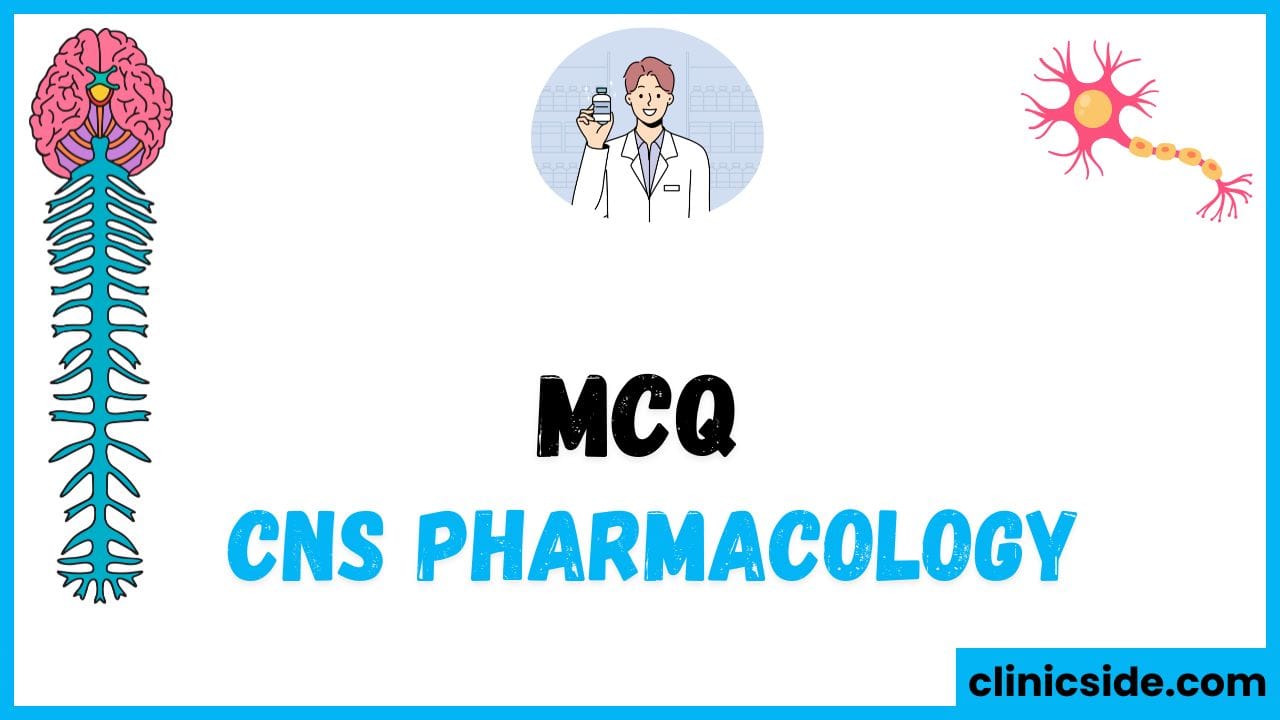Quiz
Available options: 1 to 20
Summary of CNS Pharmacology MCQs
This summary discusses various medications commonly used to treat anxiety, depression, and related psychiatric conditions, including their mechanisms of action and safety profiles.
Medications for Anxiety
Anxiolytics are vital for treating anxiety disorders. Buspirone is a partial agonist at serotonin (5-HT1A) receptors, making it a suitable option for managing anxiety with minimal sedative effects, reducing the risk of dependency. Benzodiazepines, including Diazepam and Alprazolam, are also widely used but come with a higher potential for dependence and sedation. They are effective for short-term relief of acute anxiety or panic attacks.
Benzodiazepines in Panic Disorders
For panic disorders, Alprazolam is often the drug of choice due to its rapid action in relieving panic attacks. It is a fast-acting benzodiazepine, ideal for immediate symptom management. On the other hand, Diazepam has a long half-life and is effective for generalized anxiety but can cause prolonged sedation. It is more suitable for continuous treatment of anxiety over longer periods.
Non-Benzodiazepine Medications for Insomnia
For insomnia, Zolpidem is a non-benzodiazepine hypnotic, offering an alternative to traditional sedatives. It has a lower risk of dependence compared to benzodiazepines, making it a better option for long-term use. Phenobarbital, while effective, is a barbiturate with a higher potential for misuse and overdose, thus limiting its use for sleep disorders.
Dual-Action Antidepressants
Venlafaxine, an SNRI, is effective in treating both depression and anxiety by boosting serotonin and norepinephrine levels in the brain. This dual action makes it effective for a variety of mood disorders. Bupropion, while also an antidepressant, is linked with an increased risk of seizures, making it less ideal for certain individuals. However, it can be used for smoking cessation due to its unique mechanism of action.
Safety of Antidepressants
Among antidepressants, Sertraline is considered among the safest in terms of overdose risk. Its mild side effect profile makes it a preferred option for treating major depressive disorder (MDD). Fluoxetine is also frequently prescribed to adolescents, as it tends to have fewer side effects compared to other SSRIs like Paroxetine, which has been linked to higher risks in younger patients.
Tricyclic Antidepressants (TCAs)
Amitriptyline, a frequently prescribed tricyclic antidepressant, is effective in managing both neuropathic pain and depression. TCAs function by blocking the reuptake of serotonin and norepinephrine in the brain, helping to manage mood and pain. However, they have a narrow therapeutic window, meaning overdoses can lead to significant health complications, making them less desirable in acute situations.
SSRIs in Major Depressive Disorder
Selective serotonin reuptake inhibitors (SSRIs), like Fluoxetine, are considered the first-line treatment for major depressive disorder due to their effectiveness and relatively favorable side-effect profile. They function by preventing the reuptake of serotonin in the brain, enhancing mood regulation. SSRIs are more commonly prescribed than older antidepressants like TCAs due to their safety and tolerance.
Medications for Obsessive-Compulsive Disorder (OCD)
For obsessive-compulsive disorder (OCD), Fluoxetine is frequently prescribed due to its ability to regulate serotonin levels in the brain. By increasing serotonin availability, it helps manage the repetitive thoughts and behaviors characteristic of OCD. SSRIs are generally the first-line treatment for OCD and anxiety-related conditions.
Benzodiazepine Antagonists
In the case of benzodiazepine overdose, Flumazenil is used as an antagonist to reverse the sedative effects. It works by blocking the effects of benzodiazepines, helping to restore normal brain activity. Flumazenil is essential in emergency situations where there is a risk of respiratory depression or coma due to excessive sedation from drugs like Diazepam or Alprazolam.
Conclusion
The medications discussed in this summary play key roles in treating anxiety, depression, and related psychiatric conditions. SSRIs and SNRIs, such as Venlafaxine and Fluoxetine, are widely prescribed for managing depression and anxiety due to their safety and effectiveness. Benzodiazepines like Alprazolam and Diazepam offer rapid relief for anxiety but come with a risk of dependence. Non-benzodiazepine options, such as Buspirone and Zolpidem, provide safer alternatives for long-term treatment. By understanding their mechanisms and safety profiles, healthcare providers can make informed decisions to choose the most suitable medications for their patients.





